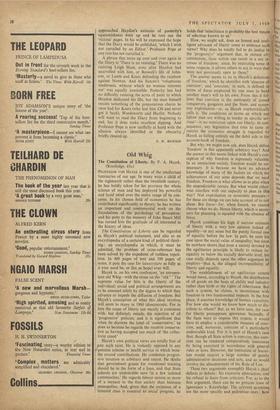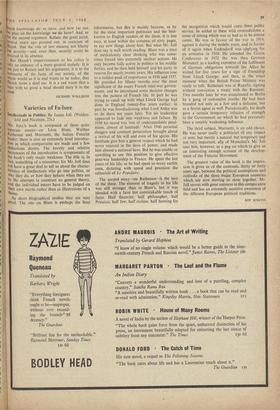Old Whig
The Constitution of Liberty. By F. A. Hayek. (Routledge, 45s.) The Constitution of Liberty. By F. A. Hayek. (Routledge, 45s.)
PROFESSOR VON HAYEK is one of the intellectual luminaries of our age. In many ways a child of the eighteenth rather than the twentieth century, he has boldly taken for his province the whole science of man and has deployed his powerful and lucid mind over the entire range of its con- cerns. In his chosen field of economics he has contributed significantly to theory; he has written an important and controversial work on the foundations of the psychology of perception; and his piety to the memory of John Stuart Mill has earned him the gratitude of all interested in the history of ideas.
The Constitution of Liberty can be regarded as Hayek's political testament, and also as an encyclopaedia of a certain kind of political think- ing: an encyclopaedia in -which, it must be admitted, the problem of cross-reference has been solved by the expedient of ruthless repeti- tion. In 400 pages of text and 100 pages of notes, it puts the case for laissez-faire as fully as it ever need be, or (let, us hope) ever will.
Hayek is, on his own confession, 'an unrepen- tant old Whig—with the stress on the "old." ' The supreme value for him is the liberty of the individual; social and political arrangements are to be assessed solely by the degree to which they advance or impede the diffusion of freedom. But Hayek's conception of what this ideal involves will seem to many in 1960 idiosyncratic. For to him the cause of liberty not merely is consistent with, but definitely entails, the rejection of all 'progressive' policies; and it is significant that when he disowns the label of 'conservative,' he does so because he regards the modern conserva- tive as having accepted too much of 'the collec- tivist creed.'
Hayek's own political views are totally free of ny such taint. He is violently opposed to any pension scheme or health service in which bene- fits exceed contributions. He condemns progres- sive taxation as arbitrary and unjust. He thinks that government grants for vocational training should be, in the form of a loan, and that State schools are undesirable save 'in a few isolated communities.' He regards labour unions as more of a menace to the free society than business monopolies. And, given that the existence of a leisured class is essential to social progress, he
holds that 'inheritance is probably the best means ae of selection known to us.' /for How, we might ask, does an honest and intel– sevc ligent advocate of liberty come to embrace such views? Why does he totally fail to do justice to the 'progressive' argument that, in certain cir- cumstances, State action can result in a net in- crease of freedom: since, by restricting some in some respects, it allows others to act, in ways that
were not previously open to them? test The answer seems to lie in Hayek's definition Ivh,
of 'freedom,' which he identifies with 'absence of lia, coercion'; and 'coercion.' in turn, is defined in mai terms of force employed by one man to bend san another man's will to his own. From this it fol- lows that coercion is the monopoly of armed conquerors, gangsters and the State, and econo- mic exploitation—or, as Hayek euphemistically calls it, 'the conditions or terms on which our fellow men are willing to render us specific ser- vices'—is no restriction upon our liberty. In con- sequence, any legislation that tries to tame or restrict the economic struggle is regarded by Hayek as falling entirely on the debit side in the account-book of freedom.
But why, we might now ask, does Hayek define 'freedom' in this apparently arbitrary way? And the answer to this seems linked with Hayek's con- ception of why freedom is supremely valuable. In an omniscient society, freedom would be un- necessary. It is because we have no advance knowledge of many of the factors on which the achievement of our aims depends that we need freedom. Freedom is what allows us to plan when the unpredictable occurs. But what would other- wise interfere with our capacity to plan in this way? Not exploitation or economic pressure— for these are things we can take account of in our plans. But force—for, when forced, we cannot choose what we do. Hence liberty, which is neces- sary for planning, is equated with the absence of ., force. Hayek combines his high if narrow estimates' of liberty with a very low opinion indeed of , equality—in any sense but the purely formal one: i ! of equality before the law. In part, he rests his 1 case upon the social value of inequality; but since,. 1 he nowhere shows_that even a society devoted to, 1 the egalitarian principle is likely to reduce in- • equality to below the socially desirable level, his, case really depends upon the other argument he, employs—that is, the alleged incompatibility of liberty and equality.
The establishment of an egalitarian system - would mean, according to Hayek, the distribution of all goods on the basis of ability and industry rather than birth or the rights of inheritance. But such a system, he claims, is inconsistent with freedom in two fundamental respects. In the first place, it assumes knowledge of human capacities. For how else would we know how much to dis- tribute to whom? But, as we have seen, the case for liberty presupposes ignorance. Secondly, if the State were to impose this system, it would have to employ a considerable measure of coer- cion, and, moreover, coercion of a particularly undesirable kind. For it is part of Hayek's case that, though all State action is coercive, this coer- cion can be rendered comparatively innocuous by being exercised in accordance with general rules or laws. However, the institution of Social- , ism would requke a large number of purely administrative decisions and acts, and so would involve the abandonment of the Rule of Law.
These two arguments exemplify Hayek's chief defects in debate : his excessive abstraction, and his refusal to learn from criticism. For, as to the first argument, there can be no genuine issue of Ignorance v. Knowledge. The re!evant questions are the more specific and pedestrian ones: how
Ha!, but ens'
Much knowledge do we have, and how tar can plan on the knowledge we do have? And, as for the second argument Kelsen, the great jurist, several years ago pointed out. in criticism of Hayek, that the rule of law ensures not liberty but security—and, even then, security could be ensured in its absence.
But Hayek's imperviousness to his critics is NlY an instance of a more general malady. It is not just to Kelsen and his arguments, it is to the testimony of the facts of our society, of the whole world as it is and wants to be today, that Hayek turns a deaf ear It is a sad waste that a Man with so good a head should bury it in the sand.
RICHARD WOLLHEIM



























































 Previous page
Previous page